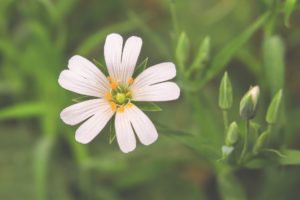
In the world of plants, there’s one humble green gem that often gets overlooked: chickweed. This unassuming little weed might just be the unsung hero your body and skin have been waiting for. Let’s dive into the wonderful world of chickweed and discover its surprising benefits. It’s one of my favorite Spring herbs and one I’ve done quite a bit of research about.
What Exactly is Chickweed?
Chickweed, scientifically known as Stellaria media, is a low-growing plant native to Europe but now found throughout the world. It’s often considered a nuisance in gardens, but don’t be too quick to dismiss it. This unpretentious herb has a long history of medicinal use dating back centuries.
Nutritional Powerhouse
Despite its small size, chickweed packs a nutritional punch. Rich in vitamins and minerals, including vitamins A, B, C, and D, as well as calcium, potassium, and magnesium, chickweed offers a range of health benefits when consumed.
Supports Digestive Health
Chickweed has a long history of use as a digestive aid. Its gentle, soothing properties make it ideal for calming digestive issues such as indigestion, bloating, and constipation. Some herbalists even recommend chickweed tea to alleviate these discomforts.
Skin Savior
But chickweed isn’t just beneficial on the inside; it works wonders for your skin too. Thanks to its anti-inflammatory and cooling properties, chickweed has been used for centuries to soothe various skin irritations, including eczema, psoriasis, and acne. Its high vitamin content also helps nourish and rejuvenate the skin, leaving it soft, smooth, and radiant. If you have chickweed growing nearby, gently pull on the stem and notice how stretchy it seems. This is indicative of how beneficial chickweed is for connective tissues.
A Natural Healer
Chickweed’s healing powers extend beyond just digestive and skin health. It has been traditionally used to treat a range of ailments, including respiratory issues like coughs and bronchitis, as well as urinary tract infections and rheumatic pains. Be sure to also read my Chickweed Herbal Monograph for other uses and information.
How to Incorporate Chickweed into Your Routine
Now that you know about the myriad benefits of chickweed, you might be wondering how to incorporate it into your daily routine. Luckily, there are several easy ways to do so:
- Chickweed Tea: Steep fresh or dried chickweed in hot water for a soothing and nourishing tea.
- Salads and Smoothies: Add fresh chickweed leaves to salads or blend them into your favorite smoothie for an added nutritional boost.
- Topical Applications: Create a homemade chickweed salve or poultice to apply directly to irritated skin for relief.
- Supplements: If fresh chickweed isn’t readily available, you can also find chickweed supplements in various forms, including capsules and tinctures.
Chickweed may be small in stature, but its benefits are anything but minor. From supporting digestive health to nourishing the skin, this humble weed has a lot to offer. So, the next time you come across chickweed in your garden or at the farmers’ market, don’t overlook it. Embrace its healing properties and let chickweed work its magic on your body and skin.
References:
- “Stellaria media (chickweed): A review of ethnobotany, phytochemistry, and pharmacology.” Journal of Ethnopharmacology, Volume 115, Issue 1, 15 August 2008, Pages 1-30.
- “The benefits of chickweed.” Medical News Today, Accessed April 2024. [Link](https://www.medicalnewstoday.com/articles/323783).
- “Chickweed.” University of Maryland Medical Center, Accessed April 2024. [Link](https://www.umm.edu/health/medical/altmed/herb/chickweed).
- “Chickweed: Uses, Side Effects, Interactions, Dosage, and Warning.” WebMD, Accessed April 2024. [Link](https://www.webmd.com/vitamins/ai/ingredientmono-181/chickweed).
Article by Kathy McCabe with assistance from OpenAI. (2024). ChatGPT (3.5) [Large language model]. https://chat.openai.com

Kathy is an herbalist/naturopathic practitioner who is constantly researching to expand her knowledge. She came to herbalism after her migraine medicine was suddenly removed from the market and she had to find something new. After discovering the magic of herbs she’s never looked back. She is accredited by the International Practitioners of Holistic Medicine (IPHM) and is an Associate Member of the American Herbalist Guild.